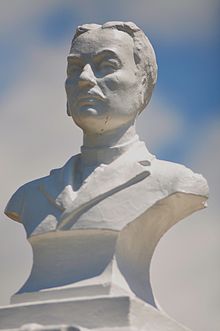Jose Panganiban
| Jose Maria Panganiban | |
|---|---|
 |
|
| Born |
José Maria Panganiban y Enverga February 1, 1863 Mambulao, Camarines, Captaincy General of the Philippines |
| Died | August 19, 1890 (aged 27) Barcelona, Spain |
| Monuments | Jose Panganiban, Daet, and Naga, Camarines Sur |
| Other names | Jomapa, J.M.P. |
| Alma mater | Holy Rosary Seminary, Colegio de San Juan de Letran, University of Santo Tomas, University of Barcelona |
| Occupation | Writer, journalist |
| Organization | La Solidaridad, Asociacion Hispano-Filipina, Free Masonry |
Jose Ma. Panganiban y Enverga (February 1, 1863 – August 19, 1890) was a Filipino propagandist, linguist, and essayist. He is one of the main writers and contributors for La Solidaridad, writing under the pen names "Jomapa" and "J.M.P."
Jose Ma. Panganiban was born on February 1, 1863, in Bangkal Phase II, Mambulao (a town which was subsequently renamed after him). He was the eldest of the three sons of Vicente Panganiban, originally from Hagonoy, Bulacan, and Juana Enverga, a native of Mauban, Quezon.
Panganiban developed his interest in reading at an early age from reading the cartilla, caton and catecismo taught by his mother. Once, his mother found him under a tree, sleeping obviously from reading Don Quixote, the book of Baao, found beside him.
Since his mother died when he was a little boy, Panganiban grew up in the care of his father, the clerk of court in Daet, the capital town of the province. His father sent him to the Holy Rosary Seminary (El Seminario del Santissimo Rosario) of Nueva Caceres (now Naga City, Camarines Sur) and became the protégé of the seminary rector Fr. Santoja. He earned the praises of his teachers because of his aptitude to easily absorb his lessons. At 12, he mastered Latin and Spanish and at 15, the Classics and Natural Sciences.
He was good at writing and was articulate in expressing his ideas. Because of this, the Spanish Governor-General Domingo Moriones who happened to be visiting the province and heard him speak during a school program commended him. In April 1878, he wrote A Nuestro Obispo in honor of Bishop Francisco Gainza who was on a visit to Mambulao. Unknown to many of his fellow Bicolanos was Panganiban’s superior academic credentials as a student at the seminary with grades of sobresaliente (excellent) in all subjects.
Father Santoja became instrumental for Panganiban’s studies in Manila. The priest recommended him to the Colegio de San Juan de Letran where he obtained his degree of Bachelor of Arts in 1883. Wanting to become a medical practitioner, he took up medical courses at the University of Santo Tomas and at the same time taking vocational courses in agriculture at Letran so that in 1885, he received the title of Agricultural Expert. While at the University in 1887, he wrote Anatomia de Regines which was recognized as one of his brilliant literary works. His papers on general pathology, therapeutics and surgical anatomy was also awarded prizes.
...
Wikipedia
